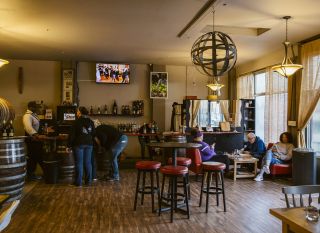
Meet Bertony Faustin, Oregon’s First Black Winemaker
A down-to-earth and diverse wine community grows right outside of Portland at Abbey Creek Winery.
Desiree Ramirez
For Bertony Faustin, being a winemaker isn’t just about the wine. As Oregon’s first recorded Black winemaker, Faustin has been building community and making waves since 2007. That’s when he launched his small-batch winery, Abbey Creek Vineyard.
The Origins of Abbey Creek Vineyard
Faustin’s parents immigrated from Haiti to the United States in the late 1960s. In order to support his family of five, Faustin’s father worked in a linen factory as a janitor and eventually worked his way up to management. “He took what he had and made it work for him,” says Faustin.
Faustin approached winemaking with this same tenacity and resilience. “Instead of trying to fit into the wine industry, I took it and made it my own,” he says. After his father’s passing in 2007, Faustin began reevaluating his own life, happiness and career. “Tragedy evokes change, and it’s up to us what that change is going to be,” says Faustin.
Instead of trying to fit into the wine industry, I took it and made it my own.
Bertony Faustin
After spending time at his in-laws’ property in Portland’s West Hills, Faustin saw an opportunity. “I saw these grapes that no one was doing anything with,” he explains, “so I decided I was going to make wine. I didn’t even drink back then.”
And thus, Abbey Creek Vineyard (or “The Crick,” as Faustin playfully refers to it) was born. It’s still in the same location but has tripled in size — from 5 to 15 acres (2 to 6 hectares).
The Creation of Abbey Creek Winery
“When I started to make wine, the plan was to be Multnomah County’s first vineyard,” says Faustin. “There was an old barn on the property that I converted and began to make wine in, but due to zoning issues, the county wouldn’t allow it.” (Wineries are required to be zoned as farm use.)
Faustin spent three years figuring out where to base his winemaking operation while still growing the grapes in Portland. He found Abbey Creek Winery’s home in North Plains, 24 miles (39 km) west of Portland. “I had to decide early on that we weren’t going to do it the way everyone else was,” he says.
The winery and tasting room, which attracts over 300 people a month, is emblazoned with a bright mural that depicts Faustin’s family breaking bread with a diverse group. Inside is modest and comfortable; wine barrels take up half the room, and visitors can see where the grapes are crushed, fermented and aged.

On a winter day in early 2018, Faustin was bumping “No Diggity” by Blackstreet and preparing for an artist to install a show on his rotating gallery-style walls. His Street Roots spread was proudly displayed, and promotional posters for his self-produced documentary film, Red, White & Black: An Oregon Wine Story, were hung beside a memorial portrait of his father. A little sign reading “The best wines are the ones we drink with friends” sat next to the register.
These snapshots of Faustin’s winery illustrate his humility, graciousness and easygoing approach to being a winemaker. In fact, many patrons visit the winery as much for community and good vibes as for the wine itself.
Wine for a Cause
Since its first release in 2008, Abbey Creek has produced small batches of Northwest classics: chardonnay, pinot gris and, of course, pinot noir. Faustin is most enthusiastic about the three batches he created to raise funds for charitable causes: “Diva” and “Sleettown” (both 2015 pinot noirs) and “Afrodite” (a 2016 rose de pinot). Faustin donates a portion of proceeds from each of these wines to a different local organization.
Each “wine for a cause” has a unique story that centers around the Black community. For instance, Faustin collaborated with a local Black sorority to create Afrodite, which supports the group’s Oregon Dove Scholarship.

Red, White & Black: An Oregon Wine Story
As the wine industry struggles with diversity, Faustin has raised his voice to discuss inequities experienced by winemakers of color. Faustin’s Red, White & Black is a film about the winemaking journey, told through the lens of minority winemakers.
Partnering with friend and director Jerry Bell, Faustin created his own production company to make the documentary. The film features Jarod Sleet of Roco Winery, Remy Drabkin of Remy Wines, Jesus Guillen of Guillen Family Wines and Andre Mack of Maison Noire Wines.
“In the wine industry, there wasn’t intentional exclusion, but it became exclusionary with no one questioning the history of it,” says Faustin. So, he decided to tell his own story, and others like his. Faustin proudly mentions that he submitted Red, White & Black to the 2018 Tribeca Film Festival. He plans to offer screenings of the film in Portland and at Abbey Creek as well.
Visiting Abbey Creek
Abbey Creek is open on weekends (tasting fees are typically $10) and is also available for private groups and parties. Its events calendar features an array of art nights, brunches and international film screenings. Abbey Creek wines can also be purchased online and at The Society Hotel in Portland’s Old Town Chinatown district.
When asked what he loves most about being a winemaker, Faustin’s answer is not about the science, traditions or techniques of winemaking — it’s about the platform winemaking gives him as a community builder. For Faustin, winemaking is largely about the people he is able to connect with. “I don’t need wine to define me,” he says. “Wine is just what I’m happy doing.”
Half of Abbey Creek’s visitors are newer wine drinkers, and Faustin loves to break down and de-mystify uppity or intimidating perceptions of wine drinking and winemaking. “We’ll talk about anything but wine when you come in here,” he says. “We just want to break bread, drink wine and chill. At the end of the day, that’s what it’s all about. Just being.”
Was this page helpful?